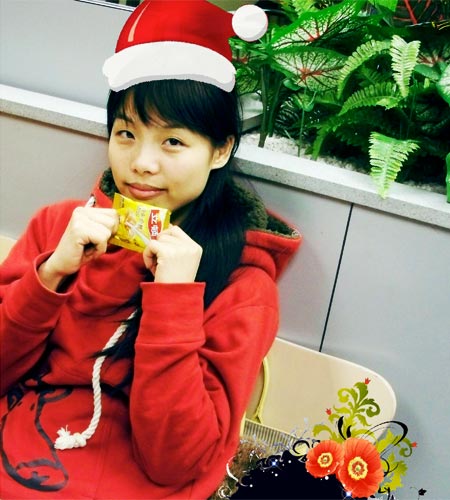|
January 2010
You are currently browsing the monthly archive for January 2010.
“Beida doesn’t even have a single robot”, Marie complained to me yesterday over a bowl of noodles. “Does Oxford have a robot?” I had to hang my head and confess – I didn’t know if Oxford had a robot or not. We had gotten onto the topic by way of discussing Avatar: “my subject is Artificial Intelligence”, she told me, “so when I watched Avatar I was thinking a lot about robots”. There then followed a 101 in what constituted a robot. I didn’t take notes and would flunk the exam, but I believe the gist is: a robot doesn’t neccesarily have to think for itself or have the ability to learn independent of human guidance, but it does need to be based on the model of man.
So were the ‘avatars’ in Avatar robots? (If you haven’t seen the film, these ‘avatars’ are human-created bodies of an alien species which can then be controlled by a human’s thoughts from afar, as if that human is the alien.) Don’t be silly, Marie chides me – they’re organic, even if human-made. The end product of a living breathing avatar which can perform complex functions under a human’s guidance isn’t ‘artificial intelligence’ … but the process by which the human’s thoughts are transmitted into the avatar does fall under the definition of A.I.
Confused? I certainly was when Marie added to the fray this gem of a sentence, this time in English: “monsters always beat robots”. Monsters vs. robots? Is this James Cameron’s next film, of which Marie has inside knowledge? Can I place an early bet? As it turns out, what she was going for was that beasts and the natural world can’t be conquered by machines – nature will always win. This, she felt, was the central message of Avatar. (And, without giving away the ending of the film, I agree – even if I consider that hope wildly over-optimistic.)
Marie and I are having noodles every evening this week to prepare for her spoken IELTS exam (International English Language Testing System) in early March, before the long Spring Festival holiday. Besides clarifying such essential vocab as “monster”, we practised grammar over her favourite choice of topic: the troubles of being a Chinese student. I have nothing but sympathy for her pronunciation issues, going as I am through the same ordeal the other way round. (“Do students not have free time over their holidays?” I ask slowly. Marie takes a confident breath and nearly shouts in indignation: “Absolutely lot!”) But she’s found a way to practise her listening and take a break at the same time: a new found love for Gossip Girl.
“Where you this entrepreneurial in college?”, I once asked Ben. In response, he forwarded me a text he keeps saved from back in the day – a run-down of all the odd jobs he did at university in Shanxi. For a snapshot of where a budding young businessman in China starts from, here it is in English:
Picking mineral water bottles [not certain if this means full ones, to sell on, or empty ones to recycle – AA]; fuduji sales [a Chinese online marketplace]; heaters; cassette tapes; event tickets; dictionaries; mobile cards; old phone cards; telephone ‘reading lamps’ [whatever that is]; seashells; collecting steel bars; distributing flyers; [arranging – I assume] home tutoring; mail order books; TaoBao startups; selling second hand books; ‘ring chains’; ‘magic poker’ [both literal translations which likely miss the mark]
How’s that for a definition of ‘miscellania’? Or indeed, ‘anything for a buck or two’. None of the above business, Ben assures me, was against the rules of his college – it’s all legit (i.e. he wasn’t hawking event tickets, he was selling them for the organisers). And no, I’ve no idea where the hell he gets his seashells from in landlocked Shanxi.
Here’s a snap of the original text, sorry for the terrible focus:

The other day, over too much food, Ben was telling me about two friends from his hometown who just got married. (I find Chinese invariably over-order when treating, for fear of appearing stingy, but Ben wins the grand prize. I put it down to some knee-jerk instinct which Chinese businessman-to-be seem to develop at the age of four.)Â As yet another egg dish appeared in front of me – despite my having protested I’d already eaten a bowl of noodles that night – I was curious to hear more.
Both of these friends come from poor families, like Ben’s, and have also moved away to try their luck in bigger cities. But how Ben related their different fortunes is telling. The first (I didn’t catch any names, unless Ben mentioned them while my face was drowning in egg soup) is an old story: college sweethearts wait five or six years before marrying, moving to the nearest big city near their littler hometown, and begin the struggle of earning their new rent with sales jobs. Ben went to see their wedding and came back full of smiles but with no comments besides: they would have married earlier if they had more money, and maybe now it is still too early.
Ben didn’t witness the wedding of his second friend (too busy with the winter rush), but had more to say about it. This guy works as a TV host for local news (“he is very handsome”, Ben interjects in careful English, as is his habit) and does pretty OK for it. What’s more, he married into money: his bride inherited her parents’ business. “I have seen pictures of their apartment”, Ben offers, and launches into a considered inventory of its square-footage and cost (500,000 kuai for the flat, another half million to furnish and decorate). I got though a whole plate of egg and tomato before he wrapped it by lowering his voice and confiding: “actually, most is paid by his wife”.
Earlier that day, I’d written my Chinese homework on 白毛女 – ‘the white haired girl‘, a peasant heroine from an old story who is forced to marry a rich, evil landlord – and how it became a hot topic online when Chinese netizens suggested the girl should willingly marry the villian for his money, rather than her poor sweetheart. (A fuller and better summary here at ESWN, well worth a read.)
Given that Ben’s description of his friend’s marriage was so speedily hijacked by analysis of their financial situation, I showed Ben my homework (so many grammar mistakes) and asked what he thought: should the white haired girl marry the rich landlord? He shrugged it off with a laugh. “Of course not.” But, he added, maybe she can’t marry her impoverished true love either unless he has earnt some more first. I thought that was quite a telling response.
As a literature grad, I didn’t expect to understand much when Marie showed me a slide or two from her Artificial Intelligence lectures. But this really takes the biscuit:

‘Fuzzification function?’ Seriously? Is this science, or a conference for sufferers of myopia? Putting my ignorance and incredulity aside for a moment, Marie tells me that A.I., her major, is what’s known as a çƒé—¨ (re men) or ‘hot subject’: i.e. one in great demand and with good prospects upon graduation. A 冷门 (leng men, ‘cold subject’), in comparison, would offer no immediate job prospects. (Like, for instance … literature.)
Marie’s parents chose A.I. as her major (no doubt because of its ‘heat’), but Marie isn’t happy. Her dislike of the subject has a lot to do with the ten-hour a day workload, and the fact that she doesn’t enjoy maths – though I’m a little Fuzzy about the details. Ever since year one, she’s been toying with the idea of switching to law or, yes, literature. (Marie too loves ‘Gone with the Wind’, and is currently listening to an English language audio tape of ‘Pride and Prejudice’ which is read, for some unfathomable reason, in a Southern US accent.) But now she’s in her fourth and final year, and it’s too late to do anything about it.
Marie is the only of my Beida friends – and I may well be wrong – who I see as studying purely for the post-graduation opportunities (the dream is to either work in Hong Kong or study in Paris), with no love of the learning itself. So, she throws herself into her other interests (no boyfriend to otherwise distract her). One, as I’ve mentioned before, is sex-jazz dancing – she still goes to classes twice weekly, near Beijing’s ancient Drum Tower. Another is improving her English: hence the Jane-Austen-meets-Texas-ranger audio tape. A third is dressing prettily. Here’s a picture from last time I invited her to eat lunch at Tsinghua:

I’ve never written about youth fashion on this blog. A major reason is that my own interest in fashion extends to finding a pair of socks in China that fit my feet (no luck yet), but no further. And I won’t start now, having just admitted my utter lack of qualifications to. But I will observe that for the most part, clothes on campus at Beida and Tsinghua (especially Tsinghua) mean jeans and a top, or occasionally a pair of extra fluffy earmuffs for girls. It really is homogenous.
So I would venture that Marie, and others like her (for instance, this girl I talked with in Beida’s coffee shop for enoVate) are exceptions in that they evidently pay attention to dressing nicely. I asked Marie how much she and her friends spent on clothes a month. About 200 kuai (a little under £20, in a very cheap clothes market) was her estimate; they shop for Western brand names but Chinese copies of them, as the originals are too pricey. I think I’ll ask her to look for socks for me.
Despite having learnt the word only a week before, it took me far longer than I care to admit to connect è’原 (huangyuan, literally ‘wilderness’) with what Matilda was trying to tell me: that she was a fan of T.S. Eliot’s modernist poem ‘The Wasteland’. (In Chinese translation, that is – and here was me thinking Eliot couldn’t possibly be any more difficult). Matilda is an applied linguistics postgrad and a literature bookworm. Out of interest, I asked her to write down for me a quick list of foreign books she likes. Here it is:
- The Old Man and the Sea (in Chinese, like all the below – although this particular one is surely as easy English as it gets)
- The Count of Monte Cristo (especially the bit where he escapes from prison – which is where I got to myself before giving up)
- Gone with the Wind (the heroine can “eat bitterness” – I’ve heard elsewhere this book is a particular favourite across China)
- Wuthering Heights (especially the vivid nature descriptions – Matilda is also one of the most unabashed romantics I know)
- The Ugly Duckling (as in the children’s story – surely a step down from Bronté?)
At the bottom, she scribbles a Chinese idiom: 读万å·ä¹¦ä¸å¦‚行万里路. “Better walk ten thousand li than read ten thousand books.” Matilda couldn’t disagree more, she tells me: she’d take the books over the exercise anyday. What’s more, she’s not only a reader but an aspiring writer, working – slowly – on her first novel. It’s set in wartime Kunming, where Beida and Tsinghua were relocated to while the Japanese held Beijing, and is a romance between a literature student and her professor.
With her permission, here are the narrator’s opening words in this first draft, along with my English translation (which I found rather tricky, comments welcome):
å¤æžœè¯´åœ¨ç§‹
Summer Fruit in Autumn
我ä¸å‡†å¤‡å†™è¯—,也ä¸å‡†å¤‡å†™å°è¯´ã€‚å¯æ˜¯ï¼Œæˆ‘善使文å—,那我总得写些什么。我写的,没有ä¸å¿ƒï¼Œæ²¡æœ‰å¼€å§‹äº¦æ²¡æœ‰ç»“æŸï¼Œæˆ‘åªçŸ¥é“æ˜¯å’Œä½ æœ‰å…³ã€‚ä¸ºæ¤ï¼Œæˆ‘回到了五åå¹´å‰ï¼Œç„¶åŽï¼Œé‡ä¸Šäº†ä½ 。我的记忆ä¸å¥½ä½¿ï¼Œä½ 告诉我,那是个å¤æžœæˆç†Ÿæ—¥ã€‚æˆ‘å› è€Œæœ‰äº†åå—,我å«å¤æžœã€‚
I’m not preparing to write a poem, nor a novel. But I’m apt to use the written word, so I’m always having to write something. What I’m writing doesn’t have a middle, nor a beginning or an end, I only know it’s about you. Therefore, I return to fifty years ago, when I met you. My memory isn’t so good, you tell me – that’s the day when summer fruit ripened. And so I got my name. I’m called ‘Summer Fruit’.
And so the story begins (“我已ä¸è®°å¾—那时的昆明天气如何…”; “I already can’t remember what the weather was like in Kunming at that time…”), but there I’ll leave you all in tantalising suspense until publication day. Instead, here’s a late merry Christmas picture from the author, doubly merry for its tardiness:

Heads up for a flurry of more substantive posts, but first … the concluding part of my trilogy of photographic triptychs (pretention alert!). The theme this time is cats, from Harbin’s Siberian tiger park and the snow-covered streets of Dalian. 注æ„安全!

(Those two characters mean ‘safety’. Indeed.) Next, a time-honoured riddle:

“Which came first: chicken or tiger?” And finally, a chance encounter:

P.S. If you’ve any trouble seeing these pics, you’re not alone. Nor can I. I’ll fix it soon. Better?
|
|








